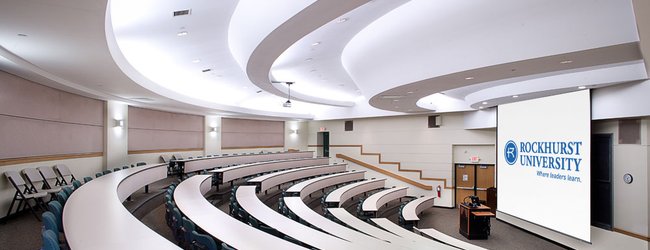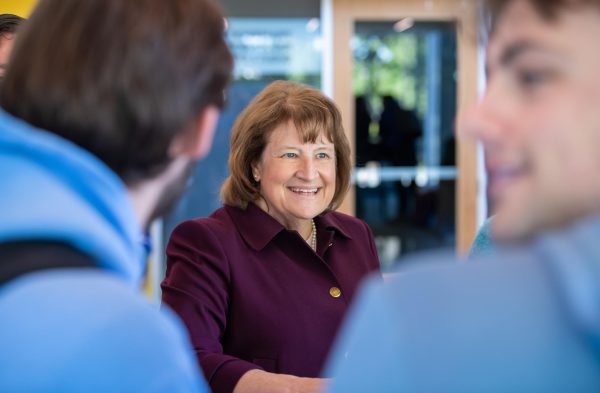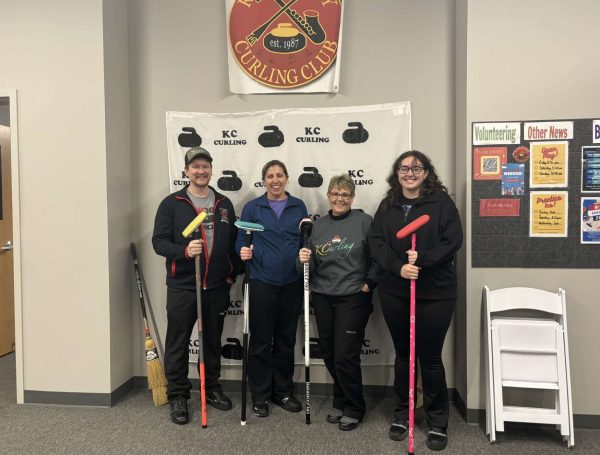Dr. Mark Pecaut delivers powerful life message at ‘Last Lecture’
“You are more than just a collection of cells.”
Dr. Mark Pecaut, Professor of Physics at Rockhurst University, spoke Wednesday night at Student Senate’s “Last Lecture” in the St. Ignatius Science Center on Rockhurst’s campus.
In his easy-going talk, Dr. Pecaut spoke at length about what he’s done over the course of his lifetime and what his experiences have taught him. There were moments of seriousness, yet also moments of laughter and fun.
Early on, Dr. Pecaut revealed that he suffers from depression. He encouraged students to understand that it’s a disease that must be accepted as that: a disease. “It’s a brain malfunction,” Dr. Pecaut said. “It’s a disease. If somebody had another kind of disease, let’s say, butt cancer. You wouldn’t say, ‘Well are you sure you have butt cancer? Maybe you just sit too much in the chair.”
While his message was serious, students did enjoy the humor. “My point here is that this is different than sadness.”
Originally from Jefferson City, Missouri, Dr. Pecaut came to Rockhurst in 2013. Before then, though, he joined the Peace Corps with his wife in 2001.
The two traveled to Ghana in West Africa from 2001 to 2003. Dr. Pecaut was hesitant to join, though. “I’m not the kind of person to ever do something like that,” he said. “That’s completely outside of my comfort zone. I would never do something like that on my own.”
It was Dr. Pecaut’s wife who convinced him to travel to the other side of the world where he would embark on a journey in which the two taught physics, biology and computer skills. “I would have never done it had she not forced me to do it,” Dr. Pecaut said of his wife’s persuasion.
Dr. Pecaut said the transition from living in the comfort of the United States to Ghana was no doubt a tough one for him. Stepping outside of his comfort zone was something he had to overcome.
After coming back to the U.S. and finding himself genuinely unhappy, Dr. Pecaut decided to fulfill his dreams of becoming a scientist. “I always wanted to be a scientist, which is a realistic dream,” Dr. Pecaut said.
His passion for both science and living life was evident throughout the lecture. As a physics professor, most would probably be surprised to learn that Dr. Pecaut has run six ultra-marathons, which consists of any race that is longer than 26.2 miles.
“When you’re doing this, it’s not just about your body,” said Dr. Pecaut in reference to the long races he runs. “There’s a mental game in there, too … it’s more than just a physical activity. It also can be super satisfying.”
To close his talk, Dr. Pecaut offered deep inspiration and advice to the 100 or so students in the audience. “If you’re in a bad situation, don’t lie to yourself. If you’re at mile 50, you know, and you really want to stop, you have to accept where you are. You’re at mile 50, and you still have 50 more miles to go.”
“Suffering is okay,” Dr. Pecaut said. “You don’t want to have the mindset of avoiding physical suffering or mental discomfort, like me being in Africa and being uncomfortable around people that didn’t speak my language. It’s okay.”
Among his numerous powerful messages, one in particular that stuck out to students was Dr. Pecaut’s message of taking “one problem at a time.”
To bounce off that theme, Dr. Pecaut ended the night with a true story he read in a book about secret forces tasked with removing American hostages from Iran in 1979. Two of the men were sleeping on what they thought was a running plane. “The airplanes were just sitting on the ground, running,” according to Dr. Pecaut. “But the inside of the plane caught on fire. They woke up and their plane was on fire.”
“So the one guy grabbed his parachute, and ran out. He didn’t know if they were in the air or if they were on the ground. They heard the engines running. So he jumped out.” Dr. Pecaut said the first man realized that they were actually on the ground.
“As he backed away, he saw one of his friends come up to the door, look out and belly flop into the sand,” he continued. “Later, he was like, ‘What were you doing? Why did you do a belly flop into the sand?’ The other man said, ‘I didn’t know if we were in the air or what. So I jumped out.’ The other man said, ‘But you weren’t wearing a parachute.’”
“One problem at a time,” Dr. Pecaut said.













Betsy Swift • Aug 7, 2017 at 4:38 pm
I knew Mark when he was a student at Saint Peter School in Jefferson City, Missouri. I was a teacher at this school. Mark was an outstounding student. He was well-liked by both staff and students. I am proud of Mark!
Betsy Swift Leawood, Kansas